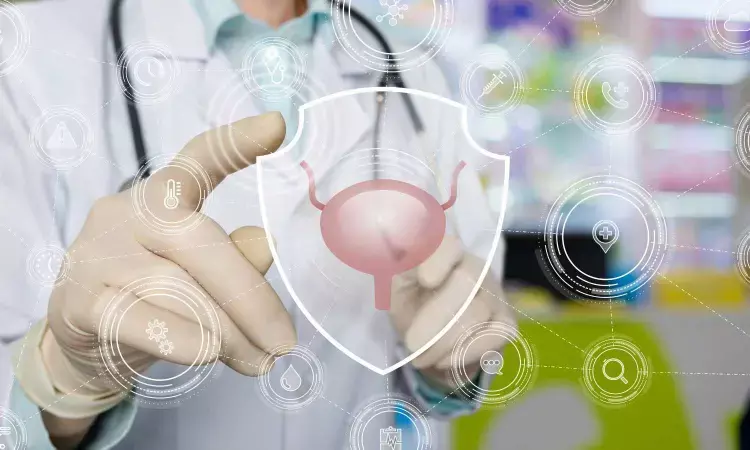- Home
- Medical news & Guidelines
- Anesthesiology
- Cardiology and CTVS
- Critical Care
- Dentistry
- Dermatology
- Diabetes and Endocrinology
- ENT
- Gastroenterology
- Medicine
- Nephrology
- Neurology
- Obstretics-Gynaecology
- Oncology
- Ophthalmology
- Orthopaedics
- Pediatrics-Neonatology
- Psychiatry
- Pulmonology
- Radiology
- Surgery
- Urology
- Laboratory Medicine
- Diet
- Nursing
- Paramedical
- Physiotherapy
- Health news
- Fact Check
- Bone Health Fact Check
- Brain Health Fact Check
- Cancer Related Fact Check
- Child Care Fact Check
- Dental and oral health fact check
- Diabetes and metabolic health fact check
- Diet and Nutrition Fact Check
- Eye and ENT Care Fact Check
- Fitness fact check
- Gut health fact check
- Heart health fact check
- Kidney health fact check
- Medical education fact check
- Men's health fact check
- Respiratory fact check
- Skin and hair care fact check
- Vaccine and Immunization fact check
- Women's health fact check
- AYUSH
- State News
- Andaman and Nicobar Islands
- Andhra Pradesh
- Arunachal Pradesh
- Assam
- Bihar
- Chandigarh
- Chattisgarh
- Dadra and Nagar Haveli
- Daman and Diu
- Delhi
- Goa
- Gujarat
- Haryana
- Himachal Pradesh
- Jammu & Kashmir
- Jharkhand
- Karnataka
- Kerala
- Ladakh
- Lakshadweep
- Madhya Pradesh
- Maharashtra
- Manipur
- Meghalaya
- Mizoram
- Nagaland
- Odisha
- Puducherry
- Punjab
- Rajasthan
- Sikkim
- Tamil Nadu
- Telangana
- Tripura
- Uttar Pradesh
- Uttrakhand
- West Bengal
- Medical Education
- Industry
Amniotic bladder therapy for Interstitial Cystitis Shows Positive outcomes

In a recent study, Raghav Madan and colleagues have discovered a potential breakthrough in the treatment of interstitial cystitis/bladder pain syndrome (IC/BPS), a condition characterized by urinary frequency, urgency, and chronic pelvic pain. The study explored the use of amniotic bladder therapy (ABT) to promote urothelial healing in IC/BPS patients, and the findings were published in International Urology and Nephrology.
IC/BPS is a debilitating condition that affects countless individuals, causing significant discomfort and a decreased quality of life. Disruption of the urothelial barrier has been closely linked to IC/BPS, prompting researchers to investigate the potential of amniotic membranes (AM) in facilitating urothelial healing.
Under general anesthesia, ten female IC/BPS patients received intra-detrusor injections of micronized AM (Clarix Flo) diluted in preservative-free sodium chloride solution. The treatment was administered uneventfully in all cases. The patients' symptoms and quality of life were evaluated using various questionnaires and assessments at pre-op, as well as at 2, 4, 8, and 12 weeks post-op.
Following the treatment, patients reported significant improvements in voiding symptoms and bladder pain, with the Bladder Pain/Interstitial Cystitis Symptom Score (BPIC-SS) decreasing significantly from baseline to 3 months post-treatment (37.4±0.70 to 12.2±2.90, p<0.001).
This improvement was mirrored by enhancements in the patients' overall physical and mental quality of life. Importantly, no adverse events, such as urinary tract infections or acute urinary retention, were observed in relation to the micronized AM injections.
These preliminary outcomes indicate that ABT may hold promise as an innovative treatment option for IC/BPS patients. While the study's findings are promising, further research is necessary to confirm the efficacy of ABT and determine the duration of its effects.
IC/BPS patients and the medical community are hopeful that this breakthrough in treatment could offer much-needed relief for those suffering from the debilitating symptoms of the condition. With further studies and validation, ABT could potentially revolutionize the approach to managing IC/BPS and provide renewed hope for patients seeking long-lasting relief and improved quality of life.
Reference:
Madan, R., Radoiu, C., Liaw, A., Lucas, S., Hamada, A., & Dhar, N. (2023). Early three-month report of amniotic bladder therapy in patients with interstitial cystitis/bladder pain syndrome. In International Urology and Nephrology (Vol. 55, Issue 8, pp. 1937–1942). Springer Science and Business Media LLC. https://doi.org/10.1007/s11255-023-03652-8
Dr Kartikeya Kohli is an Internal Medicine Consultant at Sitaram Bhartia Hospital in Delhi with super speciality training in Nephrology. He has worked with various eminent hospitals like Indraprastha Apollo Hospital, Sir Gangaram Hospital. He holds an MBBS from Kasturba Medical College Manipal, DNB Internal Medicine, Post Graduate Diploma in Clinical Research and Business Development, Fellow DNB Nephrology, MRCP and ECFMG Certification. He has been closely associated with India Medical Association South Delhi Branch and Delhi Medical Association and has been organising continuing medical education programs on their behalf from time to time. Further he has been contributing medical articles for their newsletters as well. He is also associated with electronic media and TV for conduction and presentation of health programs. He has been associated with Medical Dialogues for last 3 years and contributing articles on regular basis.
Dr Kamal Kant Kohli-MBBS, DTCD- a chest specialist with more than 30 years of practice and a flair for writing clinical articles, Dr Kamal Kant Kohli joined Medical Dialogues as a Chief Editor of Medical News. Besides writing articles, as an editor, he proofreads and verifies all the medical content published on Medical Dialogues including those coming from journals, studies,medical conferences,guidelines etc. Email: drkohli@medicaldialogues.in. Contact no. 011-43720751


